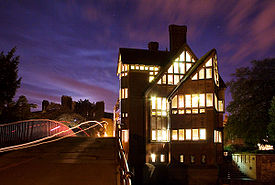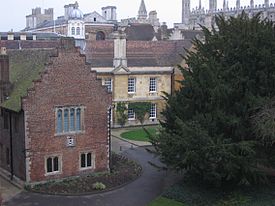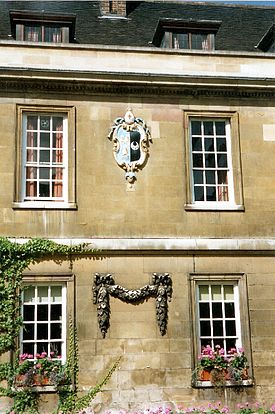- Trinity Hall, Cambridge
-
Colleges of the University of Cambridge
Trinity Hall
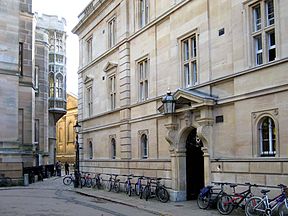
Full name College of Scholars of the Holy Trinity of Norwich Founder William Bateman, Bishop of Norwich Named after The Holy Trinity Established 1350 Admittance Men and women Master Martin Daunton Undergraduates 390[1] Graduates 231[1] Sister colleges All Souls College, Oxford;
University College, OxfordLocation Trinity Lane (map) 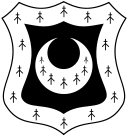
College website Boat Club website Trinity Hall is a constituent college of the University of Cambridge, England. It is the fifth-oldest college of the university, having been founded in 1350 by William Bateman, Bishop of Norwich.
Contents
Foundation
The devastation caused by the Black Death plague of the 1340s caused the loss of nearly half of the English population; Bishop Bateman himself lost nearly 700 of his parish priests, and so his decision to found a college was probably centred around a need to rebuild the priesthood. Thus in the foundation of 1350, Bateman stated that the college's aim was "the promotion of divine worship and of canon and civil science and direction of the commonwealth and especially of our church and diocese of Norwich." This led the college to be particularly strong in legal studies, a tradition that has continued over the centuries.
Buildings
The college site on the River Cam was originally obtained from the purchase of a house from John de Crauden to house the monks during their study, and the main court was built in the college's first few decades.
The chapel was licensed in 1352 and built in 1366, in the year that Pope Urban V granted the Master and Fellows permission to celebrate Mass in the college. In 1729, Sir Nathaniel Lloyd redecorated the chapel in what, despite subsequent enlargements, remains an intimate style, forming the smallest of the University's chapels. The painting in the chapel is Maso da San Friano's Salutation or Visitation, depicting Mary's visit to Elizabeth, mother of John the Baptist.
Like the chapel, the Hall of the college was rebuilt by Sir Nathaniel Lloyd and enlarged in the 19th century. It also remains one of the smallest and most intimate halls in the University.
The college library was built in the late sixteenth century, probably during the mastership of Thomas Preston and is now principally used for the storage of manuscripts and rare books. The new Jerwood Library overlooking the river was opened by Lord Howe in 1999.
The college also owns properties in the centre of Cambridge, on Bateman Street and Thompson's Lane, and on its Wychfield Site next to Fitzwilliam College.
College life
Historically, Trinity Hall was known for being strong in Law; today, it has strengths not only in Law but across a range of academic subjects across the sciences, arts and humanities. Situated on the River Cam, nested between Clare College and Trinity College, the college is known for its friendly and unpretentious atmosphere. It also performs well at sport (e.g., rowing by its Boat Club) and has well-known musical and dramatic societies.[citation needed]
It is a relatively small institution when compared to its larger but younger neighbour, Trinity College, founded in 1546. At first all colleges in Cambridge were known as Halls or Houses (e.g., Pembroke College was called Pembroke Hall) and then later changed their names from Hall to College. However, when Henry VIII founded Trinity College, Cambridge next door, it became clear that Trinity Hall would continue being known as a Hall. This is also why it is incorrect to call it Trinity Hall College, although Trinity Hall college (lower case) is, strictly speaking, accurate. Interestingly a similar situation existed once before in the history of the University, when Henry VI founded King's College (in 1441) despite the existence of King's Hall (founded in 1317). King's Hall was later dissolved in the foundation of Trinity College in 1546.
Masters and Fellows
The present Master is historian Professor Martin Daunton.[2]
See also:
- List of Masters of Trinity Hall, Cambridge.
- Fellows of Trinity Hall, Cambridge
Notable alumni
See also: Category:Alumni of Trinity Hall, Cambridge
Name Birth Death Career Hans Blix 1928 Former UN Chief Weapons Inspector Stephen Hawking 1942 Physicist J.B. Priestley 1894 1984 Writer Marshall McLuhan 1911 1980 Media theorist Frances Harrison 1966 BBC Tehran Correspondent Rachel Weisz 1971 Academy Award-winning actress Alistair Potts 1971 British World Champion coxswain Robert Runcie 1921 2000 Former Archbishop of Canterbury Andrew Marr 1959 Political journalist and broadcaster Nicholas Hytner 1956 Theatre and film director Terry Waite 1939 Fellow Commoner of Trinity Hall Geoffrey Howe 1926 Former MP and Chancellor of the Exchequer Don Cupitt 1934 Philosopher of Religion and scholar of Christian theology Mark Tully 1935 BBC radio broadcaster Samuel Pepys 1633 1703 Diarist Robert Herrick 1591 1674 Poet Admiral Howard 1536 1624 Donald Maclean 1913 1983 Soviet spy Khwaja Nazimuddin 1894 1964 Pakistan's second Prime Minister David Sheppard 1929 2005 Bishop and cricketer Ronald Firbank 1886 1926 Novelist Billy Fiske 1911 1940 Olympian and first American fatality of WWII Tony Slattery 1959 Perrier Comedy Award-winning comedian Matthew Holness Perrier Comedy Award-winning creator of Garth Marenghi Sophie Winkleman 1981 Actress Magnus Linklater 1942 Journalist Greville Janner 1928 Politician Lord Fowler 1938 Politician Lord Millett 1932 Law Lord Lord Nicholls 1933 Law Lord Nicholas Tomalin 1931 1973 Journalist and reporter Thomas Bilney 1495 1531 Protestant reformer and martyr Alfred Maudslay 1850 1931 Archaeologist, explorer, and diplomat Andy Hopper 1953 Computer Pioneer, CBE FRS FREng Emma Pooley 1982 Olympic silver medalist & Tour de France winner Tom James 1984 Olympic Gold medalist Aubrey de Grey 1963 Anti-ageing theorist Neil Barnes 1954 Respiratory Physician/Consultant (Voted by the Times Magazine one of 'Britain's Top Docs') Bruce Hendry 1955 Renal Physician William Barnard Rhodes-Moorhouse 1887 1915 First airman to be awarded the Victoria Cross Paired Oxford Colleges
Many Cambridge and Oxford Colleges are informally 'paired' with one another. Trinity Hall is paired both with All Souls College, Oxford and University College, Oxford.
See also
- June Event
- Trinity Hall Boat Club
- Ali Moeen Nawazish
References
- ^ a b "Student numbers". University of Cambridge website. http://www.admin.cam.ac.uk/reporter/current/special/04/studentnumbers0809.pdf. Retrieved 2009-10-11.[dead link]
- ^ Martin Daunton, Faculty of History, University of Cambridge.
Bibliography
- The Hidden Hall: Portrait of a Cambridge College, Peter Pagnamenta, ISBN 1-903942-31-4
- Trinity Hall: The History of a Cambridge College, 1350-1975, Charles Crawley, ISBN 0-9505122-0-6
- Warren's Book (Ed. 1911 by A.W.W.Dale)
External links
- Trinity Hall history
- Trinity Hall June Event
- Trinity Hall Boat Club
- Trinity Hall web page
- Heraldry of Trinity Hall
- Pictures of Trinity Hall by David Ranc
University of Cambridge 
Chancellor: The Lord Sainsbury of Turville (list) · Vice-Chancellor: Sir Leszek Borysiewicz (list)
Colleges: Christ’s • Churchill • Clare • Clare Hall • Corpus Christi • Darwin • Downing • Emmanuel • Fitzwilliam • Girton • Gonville and Caius • Homerton • Hughes Hall • Jesus • King’s • Lucy Cavendish • Magdalene • Murray Edwards (New Hall) • Newnham • Pembroke • Peterhouse • Queens’ • Robinson • St Catharine’s • St Edmund’s • St John’s • Selwyn • Sidney Sussex • Trinity • Trinity Hall • Wolfson
Categories: University • Chancellors • Vice-Chancellors • Colleges • Heads of Colleges • Departments • Academics • Alumni • Awards and Prizes
Websites: University • Students’ Union • Graduate Union
 Categories:
Categories:- Trinity Hall, Cambridge
- 1350 establishments in England
- Educational institutions established in the 14th century
- Colleges of the University of Cambridge
- Grade I listed buildings in Cambridgeshire
- Grade I listed educational buildings
Wikimedia Foundation. 2010.

